Now amidst the general maxims, the leading principles, the “great commandments” of the gospel; amidst its comprehensive descriptions and authorized tests of Christian character, we should take our position in disposing of any particular allusions to such forms and usages of the primitive churches as are supported by divine authority. The latter must be interpreted and understood in the light of the former. But how do the apologists and defenders of slavery proceed? Placing themselves amidst the arrangements and usages which grew out of the corruptions of Christianity, they make these the standard by which the gospel is to be explained and understood! Some Recorder or Justice. without the light of inquiry or the aid of a jury, consigns the negro whom the kidnapper has dragged into his presence to the horrors of slavery. As the poor wretch shrieks and faints, Humanity shudders and demands why such atrocities are endured. Some “priest” or “Levite,” “passing by on the other side,” quite self-possessed and all complacent, reads in reply from his broad phylactery, Paul sent back Onesimus to Philemon! Yes, echoes the negro-hating mob, made up of “gentlemen of property and standing” together with equally gentle-men reeking from the gutter; Yes—Paul sent back Onesimus to Philemon! And Humanity, brow-beaten, stunned with noise and tumult, is pushed aside by the crowd! A fair specimen this of the manner in which modern usages are made to interpret the sacred Scriptures?
Of the particular passages in the New Testament on which the apologists for slavery especially rely, the epistle to Philemon first demands our attention.
1. This letter was written by the
apostle Paul while a “prisoner of
Jesus Christ” at Rome.
2. Philemon was a benevolent and trustworthy member of the church at Colosse, at whose house the disciples of Christ held their assemblies, and who owed his conversion, under God, directly or indirectly to the ministry of Paul.
3. Onesimus was the servant of Philemon; under a relation which it is difficult with accuracy and certainty to define. His condition, though servile, could not have been like that of an American slave; as, in that case, however he might have “wronged” Philemon, he could not also have “owed him ought."[31] The American slave is, according to law, as much the property of his master as any other chattel; and can no more “owe” his master than can a sheep or a horse. The basis of all pecuniary obligations lies in some “value received.” How can “an article of merchandise” stand on this basis and sustain commercial relations to its owner? There is no person to offer or promise. Personality is swallowed up in American slavery!
4. How Onesimus found his way to Rome it is not easy to determine. He and Philemon appear to have parted from each other on ill terms. The general character of Onesimus, certainly, in




